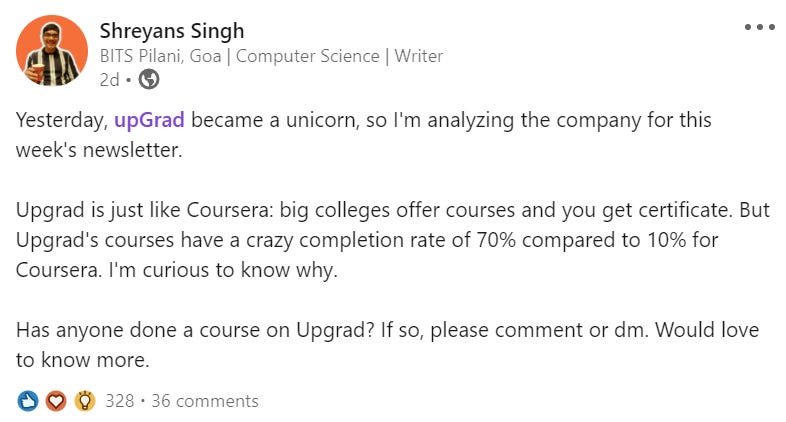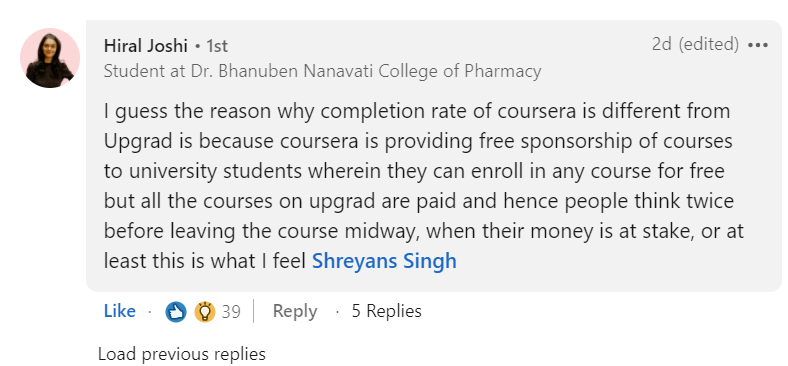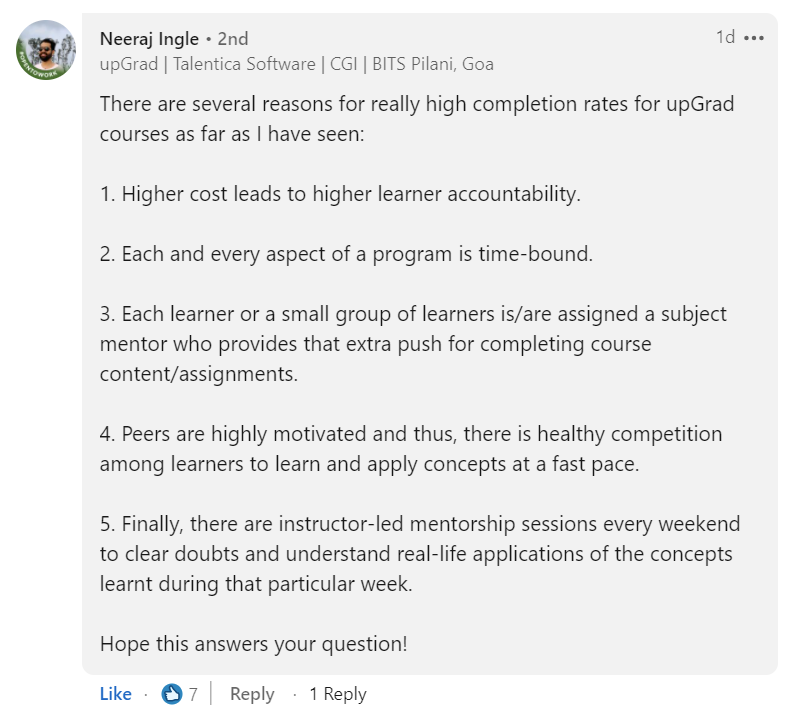Hey friends wishing you a very Happy Independence Day!! Welcome to the Independence Day special issue of this newsletter.

After reading about upGrad, I was disappointed. My first reaction was, they're just copying Coursera, nothing new. They partner with colleges and launch online courses duh.
But then I saw something surprising.
Before I tell you what this surprising thing was, let me ask you this- how many Coursera courses have you enrolled in till now? And how many of them have you completed fully?
Toppers obviously complete all the courses😂 But for the rest of us, we hardly ever complete Coursera courses. We just leave them in between😂😂
This is why Coursera's model isn't very good. People enroll in the course, and never complete it.
But Upgrad's courses have an 80% completion rate🤯🤯
80% is a crazy good completion rate for online courses. Heck, famous edtech companies like Udemy and Coursera only have a 10% completion rate👎
This is surprising, isn't it? Upgrad has "copied" Coursera, yet they have better completion rates than Coursera? How did they do it?
This is what we will find out in today's newsletter.
But first, we should understand why exactly Coursera's courses have such a bad completion rate. After all, online courses(their technical name is Massive Open Online Courses or MOOCs) were supposed to totally revolutionize education. Using MOOCs, anyone could learn anything anytime from the best teachers while sitting anywhere in the world.
But fast forward to today, and the MOOC-rush is over. Edtech companies like Udemy and Coursera which had championed the concept of MOOCs have given up on this dream and pivoted. Why
There are lots of reasons. The first is- education needs some amount of social touch- mentors, fellow students, etc. MOOCs didn't have any social factor. Plus, completing MOOCs didn't yield any immediate reward like better jobs.
For many years, MOOC companies have struggled with this fact. They tried everything to increase their course completion rates. But without success.
In the end, most of the MOOC-based edtech companies pivoted- they started selling to companies instead of people. Sad ending to the MOOC story.
But after seeing Upgrad's story, it seems that MOOCs ka picture abhi baaki hai
upGrad was started by Ronnie Screwvala, Ravijot Chugh, Mayank Kumar, and Phalgun Kompalli in 2015. These guys followed the most non-obvious strategy I've ever seen. Edtech companies like Byju's and Unacademy were printing money. Why? Because they attacked huge markets. Byju's attacked the K12 market, and Unacademy attacked the even bigger test prep market.
Upgrad went the other way entirely! They picked the smallest and narrowest market possible- working professionals.
At first glance, this seems like a bad idea. Why pick a small market when there are such big markets available?
But this was actually a big brain move. Everyone else was actually underestimating the potential of this market and no one was focussing on the same. That's why upGrad could easily win this market.
Their first course was about Entrepreneurship- "Startup with upGrad" in which 114 students had graduated in 2016.
Soon, they started offering courses like data science and MBA. These skills are very relevant for working professionals. Both sides benefitted. For working professionals, doing an Upgrad course meant upskilling themselves which meant a pay raise or a better job.
And Upgrad had meteoric growth. Their revenue grew from INR 57 crore in 2018 to a monthly revenue of INR 100 crore in 2021, which translates to annual revenue of INR 1200 crore!
Why did upGrad have such impressive growth?
2 reasons- value and affordability. Unlike Byju's, Upgrad didn't have to convince its market of the value of online courses. Working professionals are already aware of the benefits of online education. Plus, working professionals are already earning, so they can afford to pay for the courses.
Upgrad took advantage of these 2 factors and charged super high prices for its courses. I saw a course on data science that costs Rs 5 lakhs! The courses available at Coursera and Udemy are available for peanuts against this.
This was a smart move: they didn't have a big market like Byju's or Unacademy. The best way to get the most out of such a small market was to charge more from each student and hence expensive courses.
Quick point:
This is called the "higher ARPU strategy". ARPU means average revenue per user. When companies realize that the market is saturated and can't increase the number of users, they use the higher ARPU strategy. Basically, it means to increase the prices of products so that each user is now paying more for the same thing. So the company increases its revenue. iPhone has been using this strategy since iPhone 6- they dramatically increased prices to increase ARPU and hence grow revenue.
UpGrad claims ARPU (average revenue per user) to be between Rs 2 lakh and Rs 3 lakh!! This strategy allowed them to increase their revenue from such a small market. And once they saw this strategy was succeeding and people were paying for courses, they scaled it- they started offering a lot more expensive courses.
Today, they offer 100+ courses on the platform. But people won't just pay out lakhs of rupees for courses. This is where the names of colleges helped- people saw that such big colleges are offering courses, must be something good.
While the content of these courses is something new, their completion rates are something revolutionary. I mean, 80% completion rate. Wow.
I was curious to know the reason behind this, so I asked people on LinkedIn and got so many amazing responses!
This one was the most popular-
Hiral has a good point here- when people pay for something, they understand its value and are serious about completing it. Therefore, premium prices are the first and the main reason for the high completion rate. This is also the biggest difference from Coursera- they charge money only for the certificates with limited use, the course content is free.
Speaking of such certificates, Upgrad made a lot of effort to make sure their certificates were more valuable than Coursera's. They partnered with companies to accept graduates of Upgrad courses. Do you see how good this move was? It creates such a strong incentive for people to complete the course. So placements are the 2nd reason why Upgrad's courses have high completion rates.
Having the option to get placed after completing a course enhances the value of Upgrad as a whole. Just imagine; an edtech company that also gives placements? Take my money😂
This is why, last year, they acquired a company called Rekrut to further strengthen the placement factor. Rekrut was a hiring company. They had built a network of companies and helped them hire people. This was a fairly obvious acquisition. Upgrad's degree graduates could use Rekrut's network to get placed, making upGrad's courses more valuable than ever before. This synergistic benefit was also explained by Ajay Shah, MD of Rekrut
The upGrad-Rekrut synergy will disrupt the ecosystem and build an end-to-end supply chain of manpower, where Rekrut is the demand partner providing cutting-edge jobs and upGrad will supply the highly skilled, and future-ready talent. -Ajay Shah, Managing Director, Rekrut.
I also got this comment from Neeraj, who works at Upgrad, and it gives some additional insights into Upgrad's crazy high completion rate.
We've already seen point no.1, let's look at the rest of the points. Time-bound courses create a sense of discipline and urgency that Udemy/Coursera courses don't have. (Udemy/Coursera just send sweet and gentle reminders lol). Learning closely with a small group of people and having a mentor creates a social learning experience and enhances the completion rate.
Quick point:
Small group of students plus 1on1 mentorship: does this sound familiar? That's because it is the pattern for cohort based courses(CBCs). If edtech had its own twitter, CBCs would be trending at #1 right now. They are next big thung in edtech. Maybe you've heard of Stoa School, an awesome startup that has CBCs on MBA. The concept of CBCs has been very successful compared to MOOCs and they have a super high completion rate.
So, the 3rd reason is the social learning experience. If you remember, the social learning experience was the main reason why MOOCs hadn't succeeded.
Now we have understood why Upgrad's courses have such a high completion rate. Premium pricing + placements + social learning experience!!
But hey wait! In all this long explanation, I think we have lost sight of the larger picture here.
Initially, Upgrad was inspired by Coursera's model, but then they did something brilliant- they executed it better than Coursera! This is why the title of this newsletter is "Upgrad proves why you shouldn't underestimate Indian startups". Too often, we think that only American startups can innovate and Indian startups only copy their ideas. But Upgrad proves this mindset is wrong. Not only have they innovated upon Coursera's idea, but they have created an entirely new edtech model!! Upgrad's model is superior to any other edtech model right now- it is more scalable than cohort-based courses and more engaging than MOOCs.
If this doesn't convince you of India's potential on this Independence Day, I don't know what will.
The Future:
All these strategies that I have mentioned till now were used by Upgrad to become successful in its own small market. They created premium learning materials, a strong placement network, social learning experience, introduced 100+ courses- all this to increase revenue in that small working professionals market.
But how long can you expand in such a small market? After one point, you hit the ceiling.
So they started expanding into different markets- either through new products or acquisitions.
3 months ago, they acquired a company called Impartus and rebranded it as Upgrad Campus. 100+ colleges use this product to teach in online mode. They have added lots of useful features like a learning management system, proctored tests, assignments, quizzes, etc. This is an entirely new market that they have ventured into.
Then, just like other MOOC-based edtech companies, they also created a new product called Upgrad for Business. It's the same Upgrad courses, the only difference is that in this case, the customer is a corporate that wants to train its employees.
And the most daring acquisition happened last year in November: they acquired The Gate Academy. Why daring? Because this acquisition marked their entry into the test prep market, which is Unacademy's zone. They will have to face a tough fight from Unacademy in this hyper-competitive market. But hey, the test prep market is so big that it will be very lucrative for Upgrad even if they manage to keep only a small share of it.
All these forays into new markets have succeeded in turning Upgrad into a unicorn startup just inches away from profitability. The only question- which market is the next for this ambitious startup?
This wraps up today’s article. I hope you found it informative!
If you’re looking for some quick-reads, here are some awesome Twitter threads-
I hit 1000 followers on Twitter yesterday🥳🥳 Follow me there so that you don’t miss all these insights:
Thanks for being a supporter! Bye bye and have a great day!







I personally think interview prep market is next ..because they have already acquired Rekrut ..tough competition to GFG'S interview prep courses 😁
I have taken a upgrad specialisation course in my college(actually it was integrated with my CSE course), one thing I can say its pretty interactive, practice sets are amazing and the deadlines are really strict.
Not like Udemy and Coursera that you can simply reset the course module or leave it.
Well, it's a relief knowing upgrad's doing good, cuz I thought that it's something new released by college for revenue generation 😂